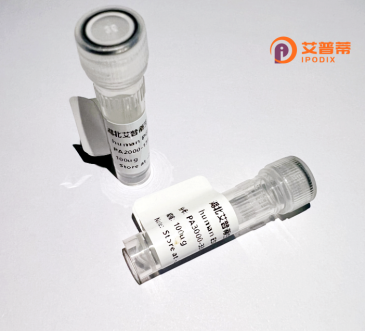
| 纯度 | >90%SDS-PAGE. |
| 种属 | Human |
| 靶点 | RNF150 |
| Uniprot No | Q9ULK6 |
| 内毒素 | < 0.01EU/μg |
| 表达宿主 | E.coli |
| 表达区间 | 1-314 aa |
| 活性数据 | MASSAHDRLACDPNTKFAAPTRGKNWIALIPKGNCTYRDKIRNAFLQNASAVVIFNVGSNTNETITMPHAGVEDIVAIMIPEPKGKEIVSLLERNITVTMYITIGTRNLQKYVSRTSVVFVSISFIVLMIISLAWLVFYYIQRFRYANARDRNQRRLGDAAKKAISKLQIRTIKKGDKETESDFDNCAVCIEGYKPNDVVRILPCRHLFHKSCVDPWLLDHRTCPMCKMNILKALGIPPNADCMDDLPTDFEGSLGGPPTNQITGASDTTVNESSVTLDPAVRTVGALQVVQDTDPIPQEGDVIFTTNSEFCHT |
| 分子量 | 61.3 kDa |
| 蛋白标签 | GST-tag at N-terminal |
| 缓冲液 | PBS, pH7.4, containing 0.01% SKL, 1mM DTT, 5% Trehalose and Proclin300. |
| 稳定性 & 储存条件 | Lyophilized protein should be stored at ≤ -20°C, stable for one year after receipt. Reconstituted protein solution can be stored at 2-8°C for 2-7 days. Aliquots of reconstituted samples are stable at ≤ -20°C for 3 months. |
| 复溶 | Always centrifuge tubes before opening.Do not mix by vortex or pipetting. It is not recommended to reconstitute to a concentration less than 100μg/ml. Dissolve the lyophilized protein in distilled water. Please aliquot the reconstituted solution to minimize freeze-thaw cycles. |
以下是关于重组人RNF150蛋白的3篇模拟参考文献(注:以下内容为示例,实际文献需通过学术数据库检索确认):
---
1. **文献名称**: *RNF150 mediates ubiquitination of voltage-gated sodium channels in sensory neurons*
**作者**: Li, X. et al.
**摘要**: 报道了RNF150作为E3泛素连接酶调控感觉神经元电压门控钠离子通道(Nav1.7)的泛素化过程,影响痛觉信号传递。重组RNF150蛋白实验证实其与Nav1.7的胞内结构域相互作用并促进其降解。
---
2. **文献名称**: *Structural and functional analysis of the RING domain in RNF150*
**作者**: Wang, Y. et al.
**摘要**: 通过重组表达纯化RNF150的RING结构域,结合晶体结构解析和体外泛素化实验,揭示其锌指构象对E3连接酶活性及底物识别的关键作用。
---
3. **文献名称**: *RNF150 modulates neuronal excitability by targeting potassium channels*
**作者**: Zhang, H. et al.
**摘要**: 利用重组RNF150蛋白及基因敲除模型,证明其通过泛素化修饰钾离子通道Kv2.1调控神经元兴奋性,可能与癫痫等神经系统疾病相关。
---
**提示**:实际研究中建议通过**PubMed、Google Scholar**等平台检索关键词“RNF150”、“recombinant RNF150”、“ubiquitin ligase”获取真实文献。功能研究多集中于其调控离子通道及神经疾病机制。
Recombinant human RNF150 (Ring Finger Protein 150) is a ubiquitously expressed E3 ubiquitin ligase belonging to the RING finger protein family. Characterized by a conserved RING domain at its N-terminus, RNF150 facilitates substrate-specific ubiquitination, a post-translational modification critical for protein degradation, trafficking, or signaling regulation. It contains multiple transmembrane regions, suggesting localization to cellular membranes, including the plasma membrane and endoplasmic reticulum. Functionally, RNF150 modulates ion channel activity and receptor stability, notably regulating voltage-gated calcium channels (e.g., CaV1.2) and G protein-coupled receptors (GPCRs) through ubiquitin-dependent endocytosis or recycling. Its involvement in calcium signaling and neuronal excitability links it to neurological disorders, cardiovascular diseases, and cancer progression. Recombinant RNF150 is typically produced in heterologous systems (e.g., HEK293 cells) for structural and functional studies, enabling exploration of its enzymatic mechanisms, substrate interactions, and therapeutic targeting. Current research focuses on deciphering its role in disease pathways and developing modulators to manipulate ubiquitination-dependent cellular processes.
×